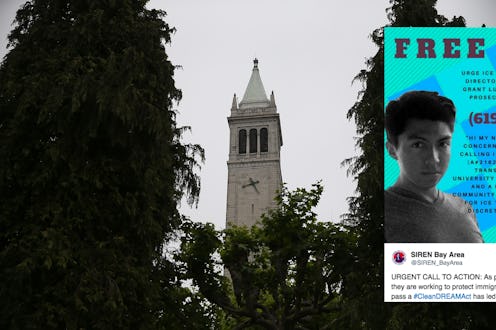News
This College Student Is About To Be Deported — Unless The Internet Can Stop It

The Daily Californian reported Wednesday that UC Berkeley student Luis Mora has been detained in San Diego and is scheduled to be deported. But the internet is fighting back with a #FreeLuis hashtag — and a lawyer who was inspired by it.
Mora was reportedly visiting his girlfriend's family in southern California over the winter break when he unexpectedly found himself at an immigration checkpoint. Border Patrol authorities detained him after he acknowledged that he was undocumented, and according to an attorney working on his case, he's now at the Otay Mesa detention facility in San Diego.
Mora's girlfriend, Jaleen Udarbe, told The San Diego Union-Tribune that Mora came to the United States as a child from Colombia, grew up in the San Diego area, and overstayed his visa. He had been trying to obtain U.S. citizenship but was unsuccessful, she said. “Luis Mora was found in violation of his visa condition,” Tekae Michael, a Border Patrol spokeswoman for the San Diego area, told The Union-Tribune.
Before transferring to Berkeley, Mora was a student at Southwestern College. In addition to volunteering at his church and tutoring non-English speakers, he worked with a campus organization to raise awareness about the needs of refugees in southern California and was given the Young Latino Champion award by The Union-Tribune in 2016. Mora told the newspaper at the time that he wanted to become a diplomat to focus on "helping as many people as I can."
While visiting Udarbe's family in Chula Vista over the holiday break, Mora and his girlfriend missed a turn home and passed by an immigration checkpoint they didn't know existed, The Union-Tribune reported. The couple quickly realized they'd have to pass through it in order to get home.
“He said, ‘This is it for me. I’m sorry,’” Udarbe recalled to The Union-Tribune.
Udarbe said that Mora told Border Patrol officials that he was an undocumented immigrant enrolled at UC Berkeley. They detained him in a temporary holding cell in San Diego, and on late Wednesday, he was transferred to a longterm ICE facility, according to an attorney working on his case. A spokesperson for ICE tells Bustle that Mora's case is being handled by the Executive Office for Immigration Review, which is in the Department of Justice, and he had no additional information on Mora's current status.
After calling Mora's mother in Ecuador to tell her that her son had been detained, Udarbe started working with a student organization Rising Immigrant Scholars through Education, an immigrants' rights organization at UC Berkeley. They started the #FreeLuis hashtag on social media, which reportedly drew the attention of immigration attorney Prerna Lal of the East Bay Community Law Center.
Lal is now working on the case, and is hopeful that the 20-year-old junior will be allowed to continue his education for the spring semester.
Mora hasn't been convicted of any serious or violent crimes, Lal said, which means he probably won't be subject to mandatory detention laws and could thus is eligible to be released on bond while the case is pending.
Although undocumented immigrants detained by ICE are often allowed to be released on bond, U.S. law requires that certain immigrants be detained throughout the duration of their case. Generally speaking, those who've been convicted of violent crimes or felonies are subject to mandatory detention, as are immigrants who've been previously released on bond but then missed their court dates.
Lal says that none of this applies to Mora, which should make him eligible for bond and — once that bond is paid — release from the San Diego detention facility.
A YouCaring page has been set up to raise money for Mora, and Lal says that the university will partially cover Mora's bond if he's offered one. Bustle has reached out to UC Berkeley for confirmation on this.
Some immigration rights activists, including Lal, have noted that Mora would be eligible to stay in the country under several versions of the DREAM Act, which Congress has considered but never passed.